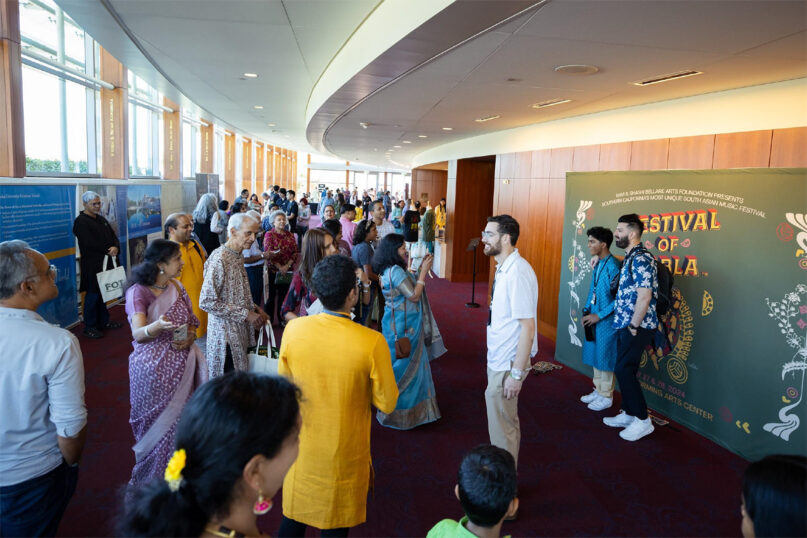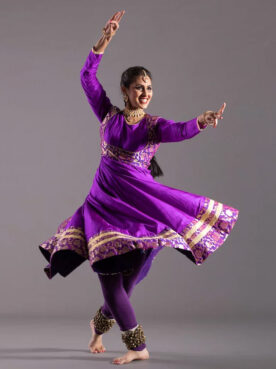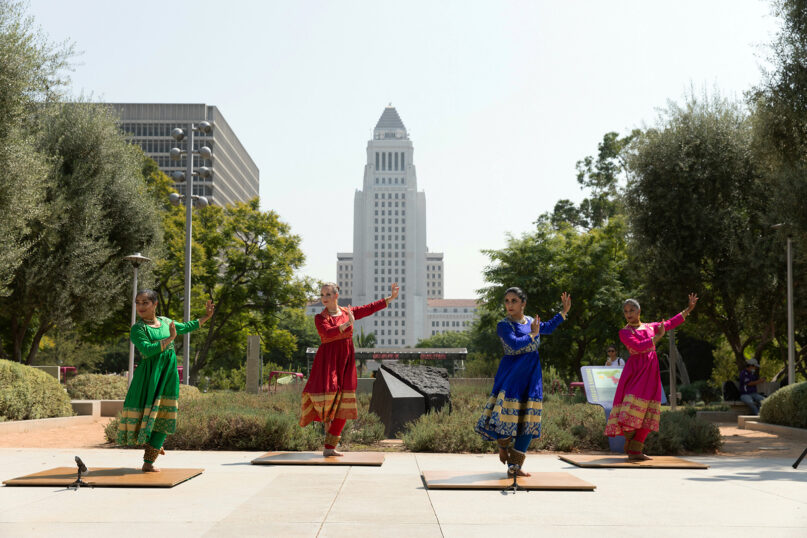
(RNS) — Last November, after five years of unsuccessful applications, Los Angeles resident Mona Kotecha and her husband, Rupesh, got a call giving them the good news: Their Indian classical music nonprofit, the Festival of Tabla, would be granted $30,000 from the federal government for the 2025 fiscal year through the National Endowment for the Arts.
The NEA had seemingly recognized the importance of the festival, which convenes some 70 amateurs and masters of the 18th-century hand drums known as the tabla for a two-day networking and performance weekend in Southern California.
The Kotechas didn’t publicize the award right away because nothing official had come in writing. “I’m glad I didn’t, because things just turned sour mid-January,” Mona Kotecha told RNS. “We were all just in shock.”
In an email, the NEA told the Kotechas that they, along with other grant recipients in the Folk and Traditional Arts sector, would not be receiving the money. Major cuts and cancellations to the NEA were announced shortly after the start of President Donald Trump’s second term, following a proposal to eliminate the institution entirely.
“You’re basically trying to put a stop to the arts,” said Kotecha. “You’re not funding us, so basically you want it to slowly die. And when arts organizations have to close their doors, that means there’s one less outlet for young or emerging artists to be able to have that platform.”

Festival of Tabla attendees mingle in the Soka Performing Arts Center lobby, July 27, 2024, in Aliso Viejo, Calif. (Photo courtesy Festival of Tabla)
Dozens of Indian cultural and religious arts organizations were affected by the funding cuts. If their awards, ranging from $5,000 to $50,000, fell outside of Trump’s “new priorities,” which the NEA stated as “projects that reflect the nation’s rich artistic heritage and creativity,” they would be terminated.
“We’re definitely angry, but we’re not just angry for us,” said Vaibu Mohan, a New York-based dancer and actor. “We are angry for everybody. Nobody should be penalized because of the type of art that they’re making and the kinds of communities that they’re serving, and that is basically what the current administration is telling us.”
Mohan, an accomplished musical theater composer and lifelong dancer of Bharatanatyam — a classical Indian dance form with roots in South Indian Hindu temple rituals — was told in December that her latest project, a musical titled “Sati: Goddess Incarnate,” would receive $10,000 of funding.
“The West still has a very limited understanding of the deep breadth of diversity when it comes to South Asia, India, and then, even more specifically, Indian religious practice,” said Mohan, whose musical tells the true story of Roop Kanwar, an Indian teenager who died in 1987 by sati, the illegal, ancient Hindu practice of a widow immolating herself on her husband’s funeral pyre.
“You definitely don’t see a lot of classical Indian dance represented at this level,” she said, adding that that lack of exposure to Sanskrit theater influences how we think of drama as a whole. “In Western theater, all of this is attributed to the Greeks, right? But it’s a little silly to think that theater started in one place. Theater started everywhere, because everybody was a storyteller in the ancient days.”

Vaibu Mohan. (Photo by Dominique Shipmon)
In May, Mohan and her co-writer celebrated the launch of “Sati,” announcing a weeklong workshop to come in August for the cast of 18. The budget for the workshop in New York in an “age of rampant inflation,” said Mohan, is steep — $53,000, including a livable wage for the performers. After losing the $10,000, Mohan was contacted by several individual donors to her mother’s Bharatanatyam nonprofit, Silambam Phoenix, where she is also the associate artistic director, who wanted to help. They have raised $37,000 of the sum from small, regular donations.
“While I’m saddened to see the state of art right now, I think there is an opportunity here to go back and learn from our ancestors and learn from the way that things were done before,” she said, “turning art back into a communal endeavor. We need great patrons, and we need people that love the work that we do and want to be a part of it and want to be our collaborator in it.”
Not everyone is so hopeful. Private donations to the Leela Dance Collective, a cross-cultural dance organization in California for Kathak — a North Indian classical dance incorporating Hindu mythology and court traditions — have also been getting smaller, said co-founder and artistic director Rukhmani Mehta.
“I’m a dancer, not a fundraiser,” Mehta told RNS. “But if you really want to do any of these art forms in a serious way, it seems like you can’t get around fundraising to solve the problem of ‘How do you pay for it all?'”
In the nonprofit arts sphere, said Mehta, each year brings a new push to get money from as many sources as possible, an “unsustainable” model that keeps art in the “realm of hobby or charity work, not in the realm of the professional world.” The rigorous grant applications, meanwhile, sometime force cultural organizations to “distort or dilute the narrative and story” to better fit a Western framework.
Two years ago, Mehta’s group started the Leela Dance Endowment, modeled after legacy opera, ballet and other arts organizations. The endowment hit $1 million, but due to a sustainable spending limit of 4%, only $40,000 is available to the group each year, “not even the salary of a full-time staff,” Mehta said.

Rukhmani Mehta. (Courtesy photo)
In short, said Kotecha, not relying on the government is not an option.
The Festival of Tabla organizers appealed the NEA’s decision in the required seven-day deadline, being careful to reword statements that included “diversity, equity or inclusion,” just in case it would affect the outcome.
“In order for us to sustain this art, we need assistance,” Kotecha said. “We’ll change words around, but we’re not going to change our mission. We’re not going to change how we involve the diverse community. We’re not going to change any of that.”
The Leela Dance Collective had been receiving a steady $20,000 from the NEA every year since 2015, and Mehta’s guru, the late Pandit Chitresh Das, was named a Heritage Fellow by the NEA in 2009 — the nation’s highest honor in folk and traditional arts.
“It’s not just the cash from the NEA that matters,” said Mehta. “It’s an institution that’s a beacon. It stands for something. While private monies are hard to access, the government is supposed to serve everybody, all of society, for small organizations, for organizations that serve communities of color. That’s what was so devastating and heartbreaking, and a great loss for this country if that institution doesn’t exist.”
The NEA did not respond to multiple requests for comment. A representative told RNS that she is not able to make a statement about grant terminations. Several NEA staff have reportedly resigned from their posts after the cuts.
“On a practical level,” said Mehta, “I feel not hopeful. If there isn’t support, then the arts die.
“But I would say that I’m leaning into my art, which really is a spiritual path. The harmonizing aspects of it, the unifying aspects of it. In this day and age, this art is needed more than ever. So I would say it’s the dichotomy of ‘This thing is under attack, and I feel defeated,’ and yet it’s the very thing from which the solutions are going to come.”

A performance of Leela Dance Collective’s “ReSound: Kathak in the Streets” in Grand Park in Los Angeles. (Photo by Margo Moritz)
